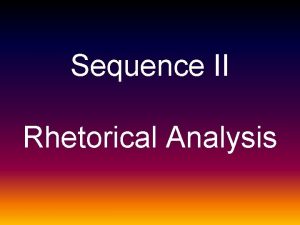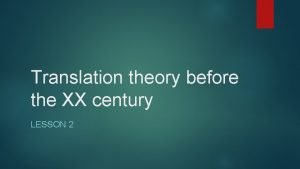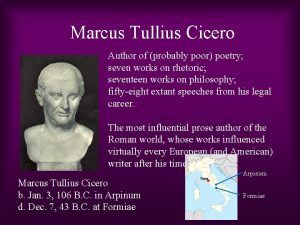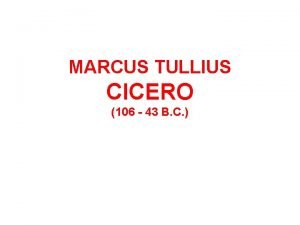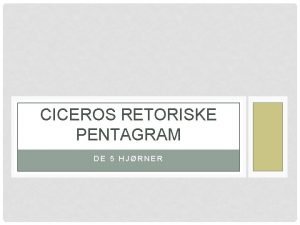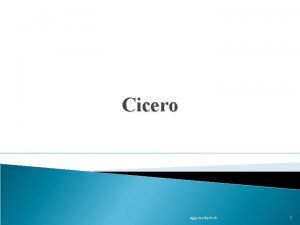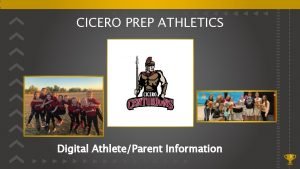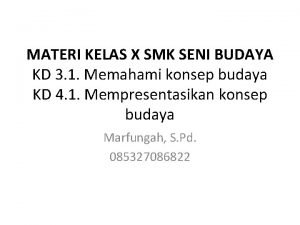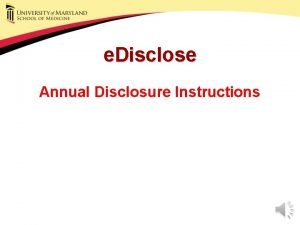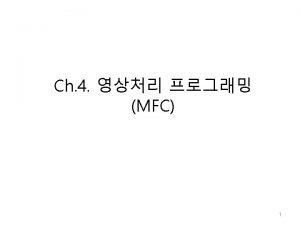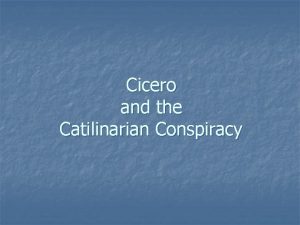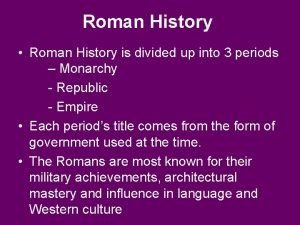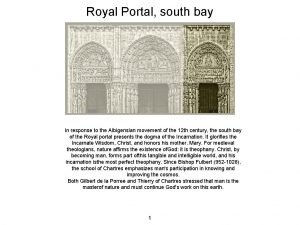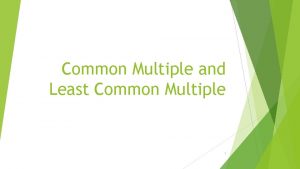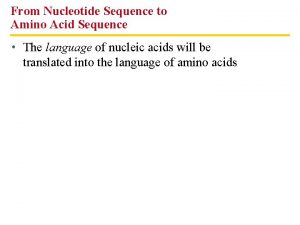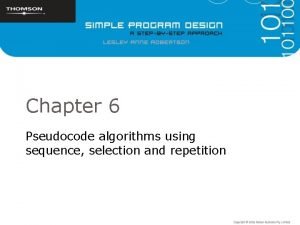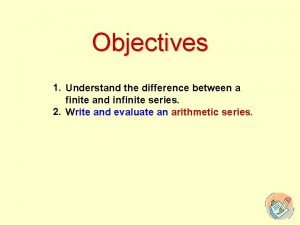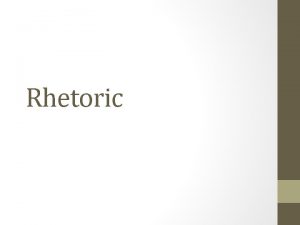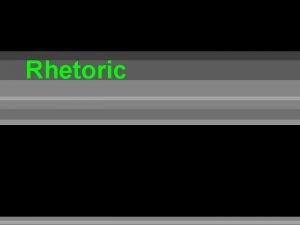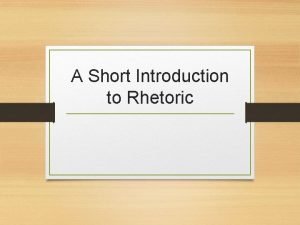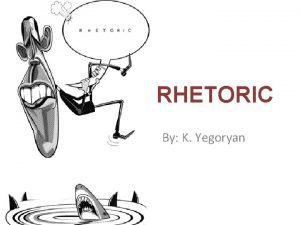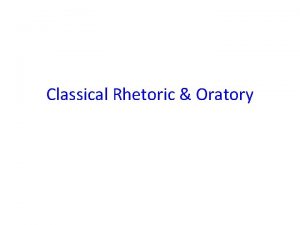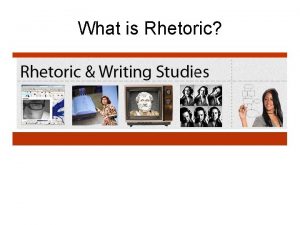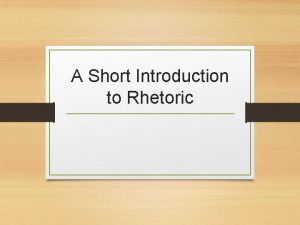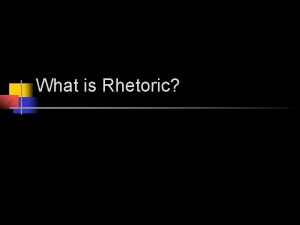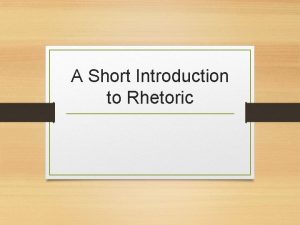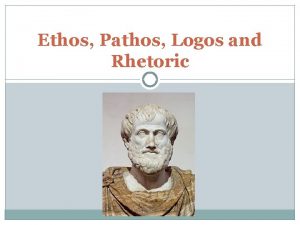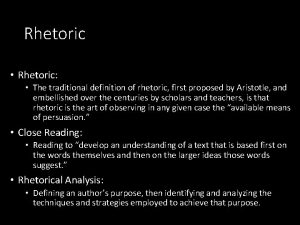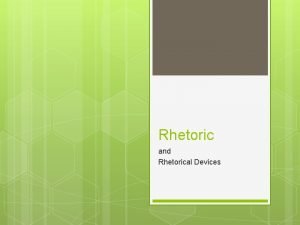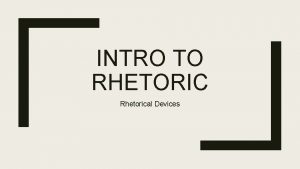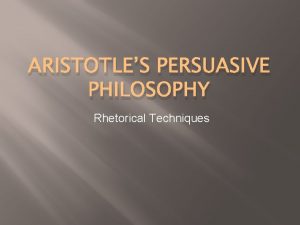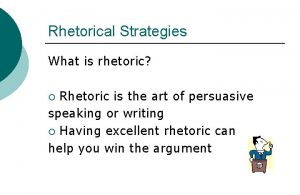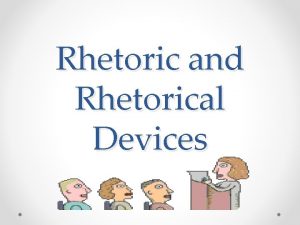Sequence II Rhetorical Analysis History of Rhetoric Cicero























- Slides: 23

Sequence II Rhetorical Analysis

History of Rhetoric Cicero called rhetoric “one great art” comprised of five lesser arts: inventio, dispositio, elocutio, memoria, and pronunciatio. These Latin words—meaning roughly invention, arrangement, style, memory, and delivery—form the 5 canons of classical rhetoric. Ancient Greek and Roman rhetoric involved the delivering of speeches to the masses. Training focused on how to say something to get what you want from an audience. Topos/place, physical gestures, enunciation, eloquence etc. What must an orator do to persuade the audience? Given this huge focus on persuasion, the negative view of rhetoric deems it unethical manipulation and trickery.

Aristotle’s Rhetoric – Book I Chapter II • “Rhetoric may be defined as the faculty of observing in any given case the available means of persuasion. ” • “Of the modes of persuasion furnished by the spoken word there are three kinds. The first kind depends on the personal character of the speaker; the second on putting the audience into a certain frame of mind; the third on the proof, or apparent proof, provided by the words of the speech itself. ”

“What is Rhetoric? ” (WP 41 -45) • “Rhetoric is about using language purposefully, in order to get something done in the world” (41). • Rhetorical situation is “the meaningful context in which arguments and ideas are shaped and communicated” (42). • Rather than mere persuasion only, rhetoric is a complex persuasive argument.

Remember: None of the following terms can be isolated. They are entangled and always influencing each other (Writing and Place 43). Things are “dynamic” in that all terms are “interacting with one other and with the context” (Everyday Writer 44).

created by David Jolliffe http: //giddings. edublogs. org/files/2009/01/jolliffes-rhetorical-framework-diagram-with-filters. pdf kairos topic medium writer/speaker/author warrant fallacy claim style format

the context of a rhetorical act (social environment, time period, political environment, events compelling one to respond, cultural or institutional conventions etc. ) Rhetorical Situation “the interaction between an audience, author, topic, and medium in a specific time and place” (Writing and Place 42)

Exigence • the event, or lack of, that compels one to speak out • urgent demand for action Example: 9/11 terrorist attack - the attack prompted response - urgent call for action - rhetoric conveying nationalism and solidarity - timing was crucial for language’s impact

Audience • • • What does the audience already know or think? What do members need or expect to find out? What assumptions can be made about them? What do they value? How do you want them to react to you and respond to the information you provide?

Purpose and Intention • the reason for writing or speaking • the aim or goal • related to “exigence” in that something compels the person to strive to achieve a particular purpose • explain? persuade? attack? defend? praise? blame? teach? entertain? enact change?

Kairos • timeliness—choosing the right time to speak/write • advantageous, exact, or critical time • a window of time during which action is most effective How is kairos different from exigence? - exigence is an occurrence - kairos is the time chosen to speak and can thus be a response to an occurrence

Writer/Speaker/Author • • What is the person’s rhetorical stance? What type of attitude towards topic/audience? What influences this person? How much does the person know? Does he/she establish credibility and authority? • What is his/her public reputation? • Does the person make any assumptions?

Appeals

Pathos connecting to the audience’s values by appealing to emotions Time magazine website/Todd Heisler Time magazine website/Alexandre Meneghini

Pathos Time magazine website/Mohammad Sajjad “Casualty A badly wounded man is carried away after a suicide bomber struck a bazaar in Peshawar, Pakistan. ”

Logos • • using information to appeal to reason exhibiting one’s knowledge arguing logically demonstration of “the truth” (real or apparent) • Within an argument using logos, however, the speaker/writer can be making one or more (sometimes A LOT) of “logical fallacies. ”

Ethos • • attempts to establish credibility and authority proving one is qualified representation of one’s character How the speaker/writer’s experience impacts the legitimacy of his or her argument Ex. Martin Luther King, Jr. "Letter from Birmingham Jail" (Writing and Place pg. 199)

Warrant • a belief, value, assumption, or experience the writer/speaker hopes the audience shares or has in common with him or her • assumptions of shared truths • If the audience does not share a writer’s warrant—assumptions about the subject or the support—the argument will most likely fail.

Fallacy • false notion • a statement or an argument based on a false or invalid inference • a gross generalization is a type of fallacy (ex. Everyone loves ice cream. ) We will be going over specific logical fallacies in a later class.

Surface Features

Style and Format • Diction: word choice; intentionally choosing certain words in order to be effectively persuasive – ex. Obama campaign • Figurative language: stylistic devices, such as metaphors and hyperbole (i. e. exaggeration) • Imagery: visuals; vivid language to represent objects, actions, or ideas; creating images that evoke a certain atmosphere, mood, or tension • Syntax: grammar and sentence structure

Diction • Is the language as clear as it needs to be for the audience? • What is the tone of the language? - humorous? - serious? - passionate? - academic? - sarcastic?

Group Activity On your way driving to school, you are pulled over for speeding (you were 10 mph over). Because you walk in too late to class, you miss the exam and would like the opportunity to take it another time. Explain the situation in writing: 1. to your parents – using ethos 2. to your parents – using pathos 3. to your parents – using logos 4. to a friend – using ethos 5. to a friend – using pathos 6. to a friend – using logos 7. to your instructor – using ethos 8. to your instructor – using pathos 9. to your instructor – using logos Post your letter to Blackboard
 Cicero rhetorical devices
Cicero rhetorical devices Cicero translation theory
Cicero translation theory Cicero poetry
Cicero poetry 106+43
106+43 Francesca cicero
Francesca cicero Ciceros pentagram sprog
Ciceros pentagram sprog Cicero and seneca
Cicero and seneca Colton sattler
Colton sattler Materi kebudayaan kelas 10
Materi kebudayaan kelas 10 Umb cicero
Umb cicero Sdi vs mdi
Sdi vs mdi Gênero
Gênero Marcus tullius cicero publilia
Marcus tullius cicero publilia Caesar and cicero
Caesar and cicero Laodicea karte
Laodicea karte Cicero catilinam denuntiat
Cicero catilinam denuntiat Cicero bibliotekssystem download
Cicero bibliotekssystem download Royal bay cicero
Royal bay cicero Lazy frog cicero
Lazy frog cicero Amino acid nucleotide
Amino acid nucleotide Repetition pseudocode
Repetition pseudocode Differentiate finite sequence and infinite sequence.
Differentiate finite sequence and infinite sequence. Convolutional sequence to sequence learning
Convolutional sequence to sequence learning You eat what you touch
You eat what you touch
